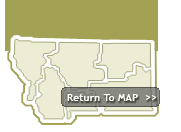

| Home | Communities | Accommodations | Places To Go | Things To Do | Site Map |
|
Glacier Country
Central Montana
Missouri River Country
Southwest Montana
Yellowstone Country
Southeast Montana
|

Town Site of Zortman and LanduskyZortman MontanaListing Type: Ghost TownCity: Zortman Montana Region: Missouri River Country 406-654-1776 http://www.maltachamber.com |  |
Gold established the community of Zortman. Although gold prospecting took place as early as the late 1860's, it wasn't until approximately 1890 when Pike Landusky and Bob Ormond struck a rich vein that the town of Zortman was born. It was named after Oliver 'Pete' Zortman, who with a partner constructed a mill near Zortman that initiated the extraction of low-grade ore from rock.
Many mines were sunk into the mountainsides - the most prosperous being the Ruby Gulch in 1904. It produced as much as $14,000 per day in gold bullion. In spite of a destructive fire in 1912, the mine flourished until World War I. The mine then shut down until the early 1930's at which time the Little Ben Mining Company was formed and the Ruby Gulch mines were reopened. This mill became the second largest cyanide mill in the world during its time of operation. Approximately 2,000 people resided in the Zortman area in the early 1920's. To accommodate this influx were nine bars, several general stores, two hotels, barbershop, small hospital, bakery, meat market, pool hall, two grade schools, livery stables, newspaper and girlie houses.
In 1936 a destructive wildfire swept through the Little Rockies destroying the majority of the mining operation. It is estimated that the mines at Zortman, Landusky and Beaver Creek produced $125 million in gold before the shut down in 1949.
Zortman's mining revival came around in 1979 but the era of prosperity ended in 1998. At present the mining operation is undergoing a reclamation plan.
Thus, Zortman has once again switched its roles from a bustling prosperous mining town to a quaint and nostalgic village of approximately 60 residents. Historic log cabins and miners' shacks lean between modern buildings and trailers in a mishmash of architecture. A white clapboard church, elegant in its simple design, sits high above the town on grassy mountainside.
Directions: Zortman is located in the Little Rocky Mountains of north central Montana. Take the paved Bear Gulch road off US Highway 191 north of the Missouri river, south of Malta.
Town Site of Zortman and Landusky
Malta Chamber of Commerce, Malta, MT 59538
|
A source for Montana Travel & Tourism Information
![]()